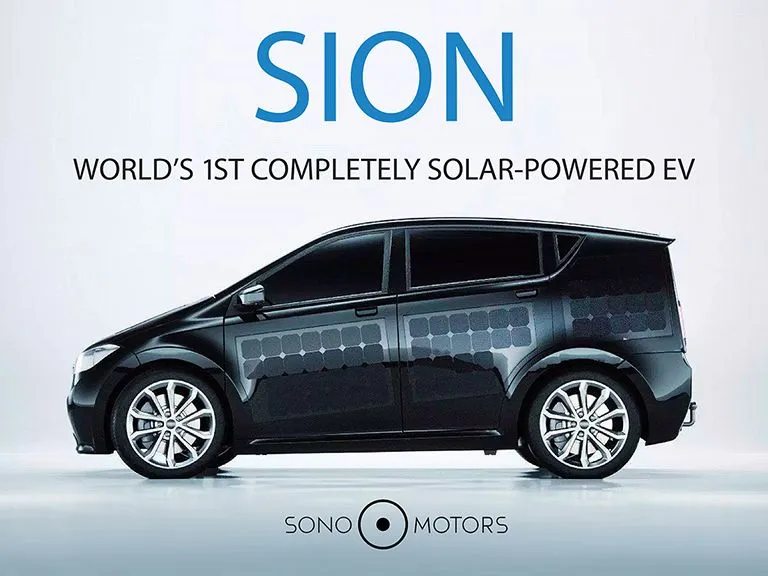
Sion will be the World's 1st Solar-Powered, Energy-Harvesting EV
Sion is a solar-powered, fully electric car, currently being developed by Sono Motors, a Munich-based German start-up. Sion’s 35kWh battery can be charged using the electric grid or its own solar cells.
By John Coulter, CMO, Current EV, July 2019
Tesla CEO Elon Musk dismissed solar panels on EVs as “not that helpful.” Sono Motors Co-Founders Jona Christians and Laurin Hahn have proved him wrong.
It took Jona and Laurin three years to transform a conventional vehicle into an electric car with integrated solar modules. They did it in Jona’s garage. When they determined their prototype worked, they set up a crowdfunding campaign to raise money for taking their prototype further.
Jona and Laurin raised over €820,000, developed their innovative electric car into an advanced prototype, and presented it to the world on July 27, 2017. The release event was a roaring success. Reports in the media all around the world jump-started preorders, which soared unimaginably the same evening. Sono currently has orders for 10,000 cars. It has big plans to bring its solar vehicle to the European marketplace. Sono will start producing its revolutionary Sion EV in 2020 at the National Electric Vehicle Sweden facilities in Trollhättan, a factory which previously produced the now-defunct Saab.
The first Sion version is expected to cost €25,000 ($28,351) for a 5-door, 5-seat car with 158 miles of WLTP-tested range. The solar panels around the car add 21 miles per day – Sono Motors notes that the average German commutes just 10 miles per day, meaning it’s possible to run many commutes off sunlight. The vehicle also supports 50 kilowatts of charging over DC power.
The Sion is an “Energy Harvesting Vehicle.” With a total of 248 solar cells it can generate a peak power of 1.2 kilowatts, sufficient for up to 34 kilometers a day. Its cabin is engineered for safety. The lightweight Aluminum Space Frame does not oxidize and is 100% recyclable.
Sion’s interior has been designed to be as sleek and straightforward as possible. A special kind of moss has been integrated into the dashboard for the breSono air filtration system. It uses electrostatic gravitation to filter up to 20% of particulate matter out of the air while offering positive effects for the temperature and humidity inside the Sion. The vehicle's infotainment system comes with a 10" touch display.
Thanks to biSono, Sion’s bidirectional charging technology, you can use your Sion as a mobile energy storage device wherever you are. While camping, on the construction site, or simply at home. A regular household plug can be used to power all common electronic devices with up to 3.7 kW. The car can deliver even more power when using a Type 2 plug, powering high-voltage devices with up to 11 kW.
Additionally, one Sion can charge another Sion. A goSono app, combined with the car’s biSono system, makes sharing the energy stored in a Sion easy and straightforward, turning the car into an independent source of energy. The Sion becomes a mobile charging station for electronic devices and other electric cars, providing them with up to 11 kW of power. You simply decide on how much electricity you’re willing to share and at which price. Then, you can offer it as a service via the goSono app. Other app users will see your Sion marked on a map as a mobile charging station, that they can head to as they wish.
Sono will keep repair costs down with a unique Low Cost Maintenance system. Standard replacement parts can be easily installed by customers. More involved maintenance or repairs of high-voltage or body parts can be done by a list of service providers provided by Sono.
Sono Motors plans to produce 260,000 vehicles over an 8-year production period. The company will make 43,000 cars per year in two-shift operations once the initial manufacturing ramp-up is completed. Sono has no plans yet to export the Sion to overseas countries like the United States. For now, this highly revolutionary EV will remain on the European continent.
Recent Posts
- The 2022 Audi Q4 e-Tron SUV combines performance, practicality and luxury
- Ford's 2022 F150 Lightning All-Electric Truck is in high demand
- Legendary Audi performance is at the heart of the 2022 Audi e-tron GT and its RS sibling.
- Meet the Lexus RZ 450e – the luxury brand’s 1st EV
- The 2022 GV60 is Genesis’ first all-electric vehicle

